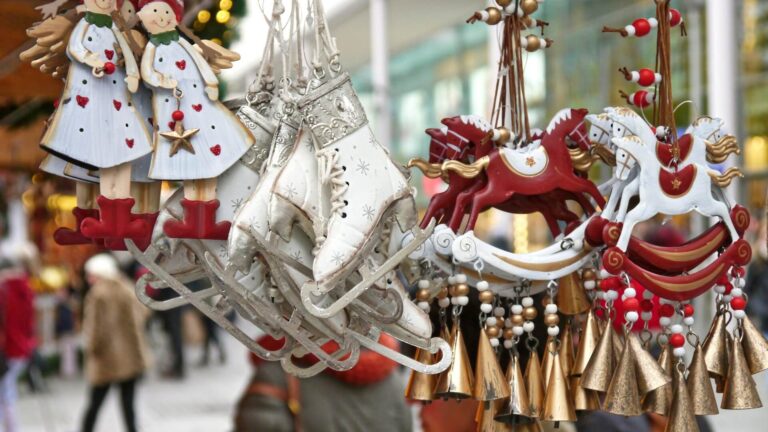
If you need a freelance travel writer or you would like to see your country, city, flight, etc., presented on the blog, drop me an email.
Find our more on Freelance Travel Writer page.
Nature has been exceptionally generous to Western Serbia, cloaking it in lush forests, cascading springs, and breathtakingly picturesque mountains. Such is the allure of our destination—welcome to Tara Mountain! Here are some incredible things to see in this natural wonderland.
They say that those who visit Tara Mountain once often find themselves returning again and again. The surroundings are so captivating, with distinct regional features that make it incomparable to any other mountain in Serbia.
FROM BELGRADE: about 180 km (via Valjevo)
FROM NIŠ: about 300 km (via Vrnjačka Banja)
My journey took me through Užice and Mokra Gora, as I had been exploring Western Serbia for over a month. I turned off the main road near the village of Kremna to head toward Tara Mountain. However, the fastest route from Belgrade to Tara National Park is via Valjevo, while taking the Ibarska Road adds another 50 kilometers but spares you some sharp curves!
I was eager to finally arrive, and my mind was brimming with anticipation. Upon learning that 80% of Tara National Park is covered in dense forest, you gain a sense of the wilderness you’re venturing into. Yet, the experience offers far more than expected: untamed nature, serene forest trails, spectacular views, tranquil lakes, and a fascinating diversity of flora and fauna.
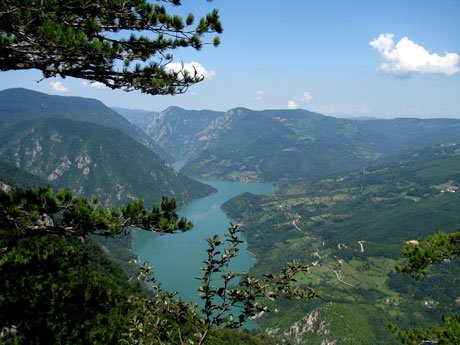
Tara National Park
Tara National Park spans nearly 25,000 hectares. Tara Mountain rises to an altitude of around 1,200 meters, with its highest peak, Kozji Rid, reaching 1,591 meters.
This region boasts one of the richest ecosystems in Europe, teeming with diverse species. Of particular importance is the Pančić Spruce, an endemic species that survived the last Ice Age and thrives in the Drina River canyons. Tara Mountain is also home to the largest population of brown bears in Serbia, and the park’s invertebrate fauna is symbolized by the Pančić Grasshopper, another endemic treasure.
The memory is still vivid—Ranko, head of the park’s tourism department, stood with me on the shores of Zaovine Lake. He recounted how Serbian botanist Josif Pančić searched for the spruce for 20 years, beginning in 1855. “There are 60,000 Pančić Spruce trees along the Drina River, and 58,000 of them are in Tara National Park!” Ranko exclaimed. Remarkably, this tree is so resilient that it can even survive in harsh urban environments and absorb pollution. No wonder it is often called the “living fossil” of European and Balkan flora.
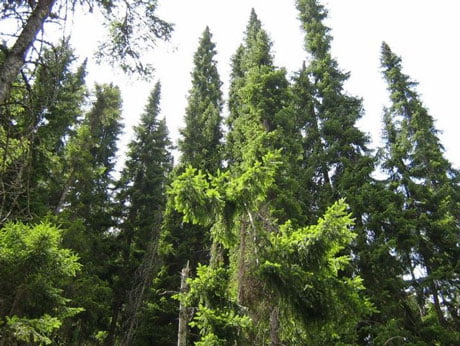
Ranko shared a wealth of information about the park’s ecosystem, highlighting its endemic species—not just the brown bears that have become Tara’s symbol, but also the Pančić Grasshopper. This peculiar insect cannot fly, possessing only vestigial wings, and is found exclusively within the park.
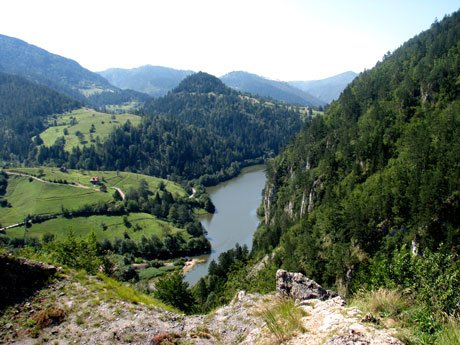
In front of us stretched the mesmerizing Spajići Lake, while the dark blue waters of Zaovine Lake shimmered in the breeze behind us. Zaovine, the village that gave the lake its name, lies at an altitude of 892 meters. Its waters are pumped up from Perućac Lake, located 600 meters below. A dam built on the White Rzav River resulted in the flooding or relocation of many houses. Today, Zaovine Lake is nearly 80 meters deep, its pristine waters reflecting vivid hues, attracting swimmers to its beaches during the summer heat.
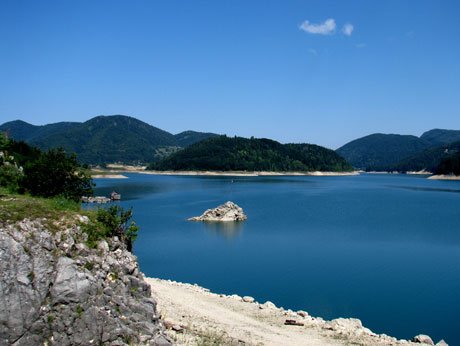
What sets Tara Mountain apart is its vastness. Be prepared for long distances between attractions, and if possible, use an off-road vehicle. This will give you a true sense of the park’s immense scale. It’s easy to lose your sense of direction, surrounded by the seemingly endless forest, so avoid wandering off-road. The occasional curious brown bear is another reason to stay on designated paths!
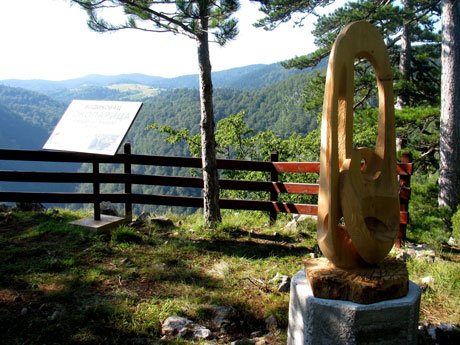
For perspective, consider Bajina Bašta, a town at the foot of the mountain on the Drina River. From here, it’s 40 kilometers to Zaovine Lake’s dam, 25 kilometers to the Mitrovac resort, 33 kilometers to Predov Krst, and 16 kilometers uphill to Kaluđerske Bare. These resorts are excellent bases for exploring Tara’s famous viewpoints, which are not to be missed!
Perhaps you’ve seen a photo of Tara Mountain with a breathtaking view of the Drina Canyon framed by the branches of an ancient pine tree. It’s every bit as surreal in person! The Drina’s turquoise waters look as if painted in Photoshop. Official viewpoints in Tara Mountain include Banjska Stena, Crnjeskovo, Bilješka Stena, Osluša, and Sjenić. Ranko and Marija from the National Park rattled off even more, but it was impossible to jot them all down while bouncing along a rugged path from Osluša to Sokolarica.
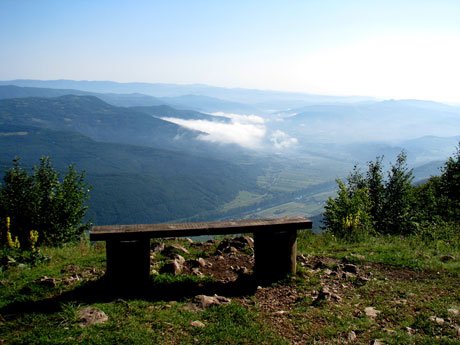
Information about these viewpoints and other activities in Tara Mountain can be found at National Park checkpoints in Bajina Bašta, Mitrovac, and Perućac, or at the Bajina Bašta Tourist Information Center. You can rent bikes, kayaks, binoculars, or hiking poles. You can also hire a guide or even book a bear-watching tour. (Read more in the following post: Active Holiday on Tara Serbia.)
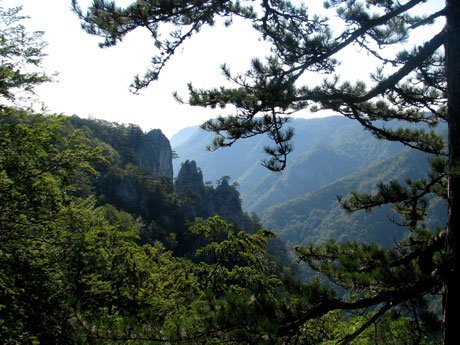
On my last morning in Tara, I discovered off-road tours were also available. I stayed at the Mijailović Mountain House in Kaluđerske Bare, where Nataša, my host, told me over a coffee about her experiences as a guide. Many foreigners are drawn to this type of adventure. Some book off-road tours months in advance, while others combine them with visits to Uvac Canyon, Zlatibor Serbia, or Mokra Gora. Nataša noted that Israeli visitors especially enjoyed hands-on activities, like learning to make traditional pies in a nearby village household.
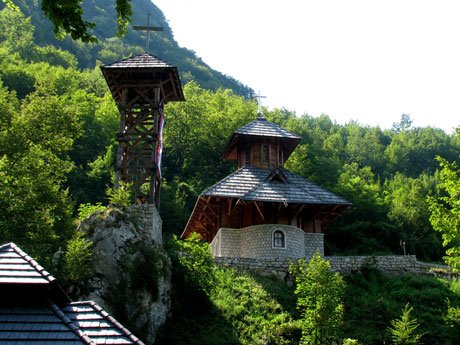
Drina River
Although there are numerous rivers in the area, including White Rzav, Rača, Derventa, and Brusnica, one river clearly dominates: the Drina. This majestic river encircles Tara mountain to the north and northwest, flowing all the way from Montenegro. It serves as the natural border between Serbia and Bosnia before becoming the largest tributary of the Sava River. The Drina is renowned for its riffles and rapids, the spectacular meanders of its canyon, as well as its dams and lakes. With a canyon depth ranging from 700 to 1,000 meters, it is the deepest in Serbia and the third deepest in the world. Once a wild, untamed river, the Drina is now a hotspot for rafting enthusiasts and a beloved destination for fishing lovers.
Drina Rafting is probably the most famous event of its kind in Serbia. Held every third week of July, it has become a massively popular festival. The tradition began 25 years ago and includes various contests, such as preparing traditional fish soup or diving from the bridge. But don’t think rafting is the only attraction when visiting the Drina in summer. For instance, take a trip to the beach at Perućac Lake! The lake was formed when a 461-meter dam was built here. Stretching 50 kilometers in length and 85 meters in depth, the lake becomes a lively hub in July and August when water temperatures reach 22 degrees. Finding a free spot on Perućac Beach during these months is no easy feat! Along the riverbank, you’ll notice small floating houses, numerous boats, and fishermen. The lake also draws those who enjoy water sports.
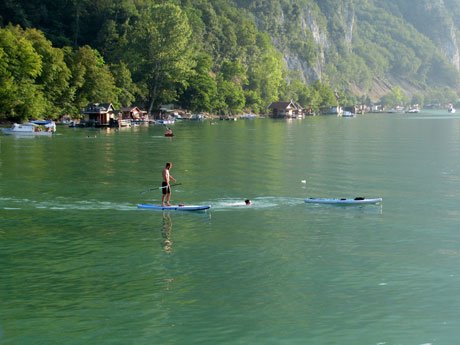
Make sure to visit a tiny river that locals describe as being “as long as the year itself.” Located in the heart of Perućac, 13 kilometers from Bajina Bašta, the Vrelo River stretches only 365 meters! I visited the Vrelo earlier that year, but the rainy weather transformed this typically calm river into a roaring force of nature, making it almost unrecognizable.
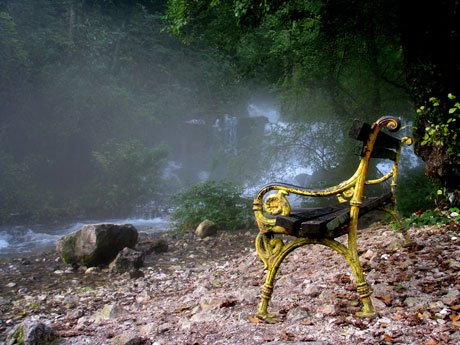
Western Serbia’s waterways were particularly swollen this summer, with springs gushing and water bursting from nearly every rock. The constant rain until early August gave way to brief dry spells, during which even the small Vrelo River turned formidable. Its short flow ends dramatically in a lovely 10-meter waterfall that tumbles directly into the Drina.
While exploring the Drina, remember the breathtaking canyon you might have seen from the Banjska Stena viewpoint on Tara Mountain. This time, take a cruise from Perućac Lake through the canyon all the way to Višegrad in Bosnia. Once there, you can admire the famous Drina Bridge and explore the charming town dedicated to Serbian Nobel Prize-winning author Ivo Andrić.
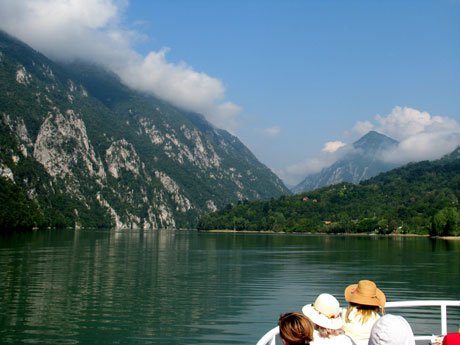
As the guide Neđo’s voice echoes through the boat speakers, explaining why it’s “so good to be a brown bear on Tara mountain”—protected species, regular feedings from locals, and even compensation from authorities for any damage they cause—you’ll find yourself captivated by the stunning views. The passage through the steep Drina banks narrows at times. On the left, another river, Bistrica, flows into the Drina, bringing with it a cool breeze. Further along, you’ll pass the Žepa River and encounter a few medieval necropolises, added to the UNESCO World Heritage List in 2016, along with similar sites in Perućac.
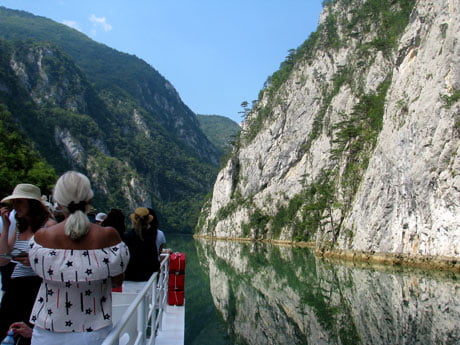
The cruise to Višegrad is organized by Tara Tours, whose owner, Goran Glišić, shared how he bought and refurbished the boat, now named Grizzly, in Belgrade. This cruise first launched in 2017 and quickly became a fantastic way to promote the area, attracting more than 200 guests during its debut.
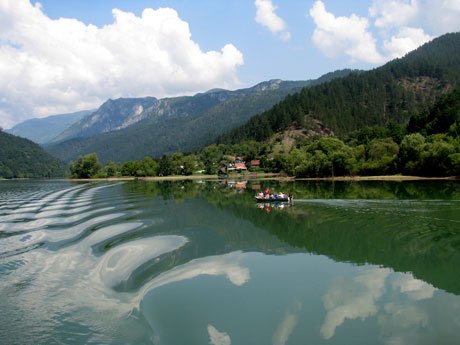
The experience aboard the boat is unforgettable. With pleasant music in the background, a cool breeze on the deck, and breathtaking scenery surrounding you, the journey is as enjoyable as the destination. Reservations are necessary, as the boat accommodates 140 passengers. The cruise departs at 9 a.m., complete with a roll call and ID checks. Serbian citizens can travel with a national ID, while others should bring passports and verify visa requirements, as Višegrad lies across the border in Bosnia. The three-and-a-half-hour cruise allows for over two hours in Višegrad to visit the famous bridge and explore Andrićgrad (also known as Andrićtown), with a return to Perućac by 6:30 p.m.
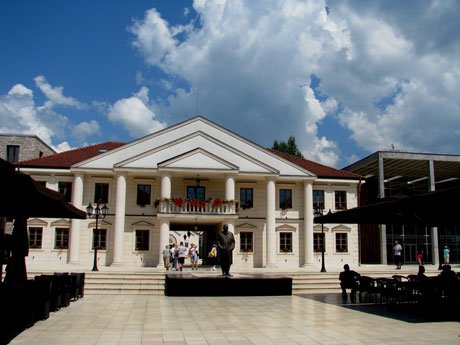
Andrićgrad, also known as the Stonetown (unlike the wooden one he erected in Mokra Gora Serbia), was built by acclaimed Serbian film director Emir Kusturica and opened in 2014. It brims with symbolism, with every building tied to Ivo Andrić. Even the bookstore bears the name of his favorite book, Either/Or by Danish philosopher Søren Kierkegaard. Visitors can enjoy kebabs at the Turkish Kasaba restaurant or savor a sweet treat at the Secession pastry shop.
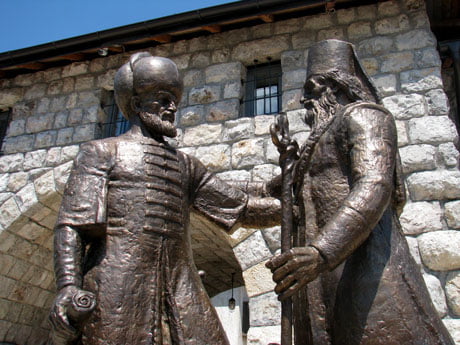
At the town’s entrance, you’ll find a new statue dedicated to the Sokolović brothers—Mehmed Paša, who built the famous Drina Bridge in 1571, and Makarije, who became the patriarch of the restored Serbian Patriarchate of Peć in the 16th century with his brother’s support.
As for the Drina Bridge itself, it is steeped in history. Walking across it feels like stepping back in time. If you haven’t read The Bridge on the Drina by Ivo Andrić, now is the perfect opportunity. The novel will deepen your understanding of this extraordinary place and its timeless significance.
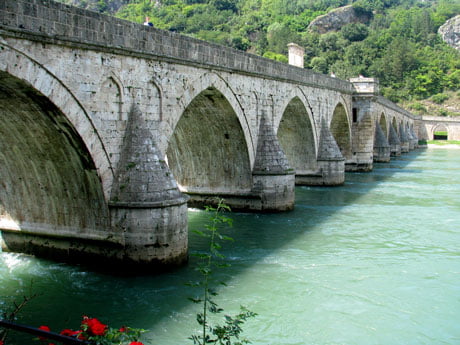
Bajina Bašta Serbia
The population of this charming town, according to 2011 data, is approximately 26,000. It lies at the foot of Tara Mountain, nestled on the right bank of the Drina River. Bajina Bašta was established in the mid-19th century when Serbian ruler Aleksandar Karađorđević issued an order to that effect in 1858. Various legends surround the origin of the town’s name, but the most popular one suggests that it was named after a Turkish man, Baja, who owned a vast garden (bašta in Serbian).
The town’s intensive economic development began in 1966 with the construction of the Perućac hydroelectric power plant.
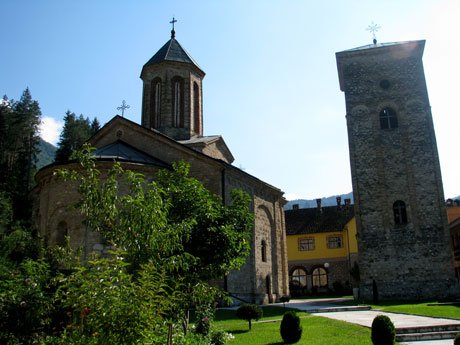
When it comes to historical and cultural landmarks, the Rača Monastery holds particular significance. Located on the slopes of Tara Mountain, just 6 km from Bajina Bašta, the monastery sits near the picturesque canyon of the Rača River. According to tradition, the monastery dates back to the 13th century when Serbian King Dragutin founded it. Over the centuries, it was destroyed twice, and its current appearance dates from 1835. The monastery famously housed the Miroslav Gospel, the oldest known Serbian book from the 12th century, during World War II. King Dragutin’s remains are also kept here.
Nearby, about a 40-minute walk up the Rača River, once stood a renowned monastic school. Here, monks meticulously copied manuscripts and created beautiful decorative illustrations. Sadly, the school was closed in 1690, but its legacy endures.
For those familiar with Bajina Bašta, the first thing that likely comes to mind is the iconic House on the Drina River. This small wooden house perches precariously on a rock in the middle of the river, a testament to the ingenuity and perseverance of locals. The river can be wild, and a few years ago, it swept the house away. Yet, the determined townsfolk rebuilt it, even more charming than before, right back on the rock.
You might wonder how that rock ended up in the middle of the river. According to legend, Serbian folk hero Marko Kraljević, renowned for his incredible strength, tossed the rock from Tara Mountain so his horse wouldn’t get wet crossing the Drina. The horse supposedly leaped twice to cross, and locals say the imprint of its hoof is still visible on the rock today.
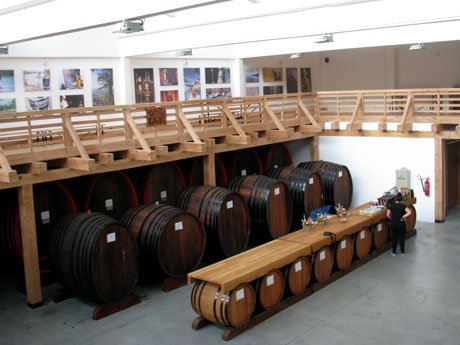
When it comes to cuisine, Bajina Bašta and Tara Mountain are havens for the delicious specialties of Western Serbia. Indulge in traditional buns with kajmak, pršuta, fresh fish, and a variety of cakes. And, of course, no visit would be complete without sampling Serbia’s national drink—rakija! Bajina Bašta is home to one of the oldest and largest rakija distilleries in Serbia, producing the famous “BB Klekovača” brand.
The moment you step inside the distillery, the aroma of alcohol greets you. The friendly host will guide you through the facility, showing you enormous barrels storing an impressive 200 tons of rakija. Before you know it, you’ll have tasted several varieties—the aged plum rakija, the quince rakija that has matured in oak barrels, and the young blackberry and raspberry rakija, made from the fruits Tara Mountain is celebrated for.
Just make sure you have someone to drive you back up those scenic mountain curves afterward!
I must not forget to mention accommodation, as many of you often ask me about it. What you need to know is that Tara Mountain truly offers lodging options for every taste, with a variety of cabins, cottages, and private rooms available—just what most people are looking for. (Click the link to explore some recommendations.)
However, here you’ll find not only hotels (like the Zepter Hotel in Bajina Bašta or their villa in Perućac) but also adorable cottages on the Drina River. For example, click here to see one of the cottages in Perućac, or follow this link for a cozy mountain retreat with a view of Lake Zaovine.
No matter where you decide to stay, you won’t regret it—nature is right at your fingertips the moment you open your window in the morning!
Next destination – POŽEGA & UŽICE SERBIA ATTRACTIONS
The full THINGS TO DO IN SERBIAsection
PIN IT FOR LATER:
If you need a freelance travel writer or you would like to see your country, city, flight, etc., presented on the blog, drop me an email.
Find our more on Freelance Travel Writer page.
I am looking forward to working with you.




30 responses
Wow… Unfortunately, I didn’t have a chance to visit this paradise…
Hey! Oh well, you’ll have to come again then. 😀
How are you, all’s well I hope? <3
Yes! 😀
All is well, yeah, thanks. I was in Ukraine, and then Datça. Now I’m home, starting again. How are you?
I’m home, finally. 😀 Was going around Western Serbia for month and a half, climbing mountains and cruising rivers, but at least I have enough material for Serbia posts for several month ahead. 😉 Really enjoyed the journey, slowing down a bit now.
Datca is Netherlands or Germany? If it’s the first, would love to go myself, never been yet.
Oh yes, I can see that you had refreshing time. Beautiful places… Wonderful pictures…
Datça is in Turkey, Marmaris, across the island of Symi. It is beautiful, but was too crowded because it was a religious holiday.
Oh, yes, sorry, I remember the place. You said that your mother lives there, right? You were there when I was in Symi last summer, how could I forget! 😀 Would love to see it myself. 🙂
Yes! I definitely agree with you. You should see the peninsula. So many beautiful and peaceful bays to swim… Knidos ancient city is there too. The geographer Strabo said: “God sent his beloved creatures to Datça for them to live longer.”
Come, be our guest and live longer 🙂
How can one resist such an invitation! 😀
Good to know, it’s definitely on the bucket list. <3
I’ve been checking the blog posts I’d written on Datça, but mine are mostly about the villages around. You might have a look at the pictures here: https://ozlemsoydan.wordpress.com/2014/04/12/datca-5/
See you in Datça <3
Beautiful sunsets and such a crisp clear water! Thank you, Ozlem, love it! <3
I gave friends your blog in order for them to spend a month in Serbia. Some superb travel writing.
Hey thanx, so nice of you! 🙂 Hope they’ll have great time in Serbia, there’s so much to see. And hope my posts will come useful.
Thanks again. <3
Oh wow! This looks like my kind of adventure. Well except for the brown bears! I’ve never heard about Tara mountain before. What a beautiful & fascinating part of the world. And Drina River just looks insanely good. Would love to try some of those water sports.
I’m sure you’d love it in person. If you’re into skiing and winter fun, then you should come during winter. But, if you prefer water sports, river and mountain greenery, the best time to be here is in July and August. At least that’s the best time for the beach. 😉
Thank you! <3
Wow, what a stunning place. I know much of Croatia well, but not Serbia at all and I had no idea it was so stunning. Now I want to go and see the Tara mountain and the Drina bridge for myself
So glad the post made you want to go. The whole of Western Serbia is really breathtaking for nature lovers. Let me know if you need any info.
Thank you! 🙂
Wow gorgeous. I didn’t know how beautiful the landscape was in Western Serbia. I like all the history tidbits. 26,000 population is great compared to where I lived. Really allows people to spread out and enjoy.
Hey, thank you! Hehehe, yes, it’s a nice small town with a lot to do. Being at the foot of the mountain and on the river bank brought a specific charm to Bajina Basta . 🙂
This is the first time, of the many times I’ve read travel blogs, that I’ve read something about Serbia. Wow, it is a paradise. The Spajici Lake, Banjska, River Vrelo are absolutely stunning and dream like!
Really? Well, I’m so glad that I was able to give you few details about this part of the country. You can find more about it in the Weekend in Serbia section on the blog, feel free to browse around. Thanks! 🙂
The views from Tara mountain and the scenery around Tara National Park are absolutely stunning. Your so lucky you were able to visit with such knowledgable guides!
We passed through Serbia last year but we only had time to see a bit of Belgrade. I hope I get to go back soon and see more of the countryside!
You should. I mean, Belgrade is great, it’s the capital anyway, but there’s also so much to see apart from the city. If you need any info, don’t hesitate to ask.
Thank you for stopping by! 🙂
Serbia is slowing gaining attention of tourists. I am keen to get there.
The places you mentioned are interesting. Need to orient myself with the places with the help of a map.
Great captures of the scenes around.
Everything mentioned in the post is pretty near, the area is not that big, so it would be easy to navigate once you are there.
Hope you’ll be able to see Serbia soon, thank you! <3
Serbia is so beautiful and green. I think the architecture is amazing too from what I have seen. I really want to go and visit. Is the cost of living cheap?
Yes, pretty cheap comparing to the Western European standards. And you can find different architectural styles throughout the country. It really is worth a visit. 🙂
Wow, Serbia is so incredibly beautiful! The Tara Mountains look like a great place for a shoulder season break away from the summer tourist overcrowding. I’d love to see the brown bears – or even discover the crickets!
Tara National Park is actually hosting the whole brown bear watching and it’s incredibly interesting. There are small watch houses where you spend few hours looking out for bears to come to the feeding ground. Sometimes you see them, sometimes you don’t depending on the season. But the whole thing is in regards with the species preservation. I was amazed! 🙂
Thanks. <3
I’ve been to Serbia, but only Belgrade for a weekend getaway. Seeing your photos of the natural areas of Serbia makes me want to go back and explore more though. So pretty!
If you happen to come again, don’t hesitate to ask for few details. 😉 You can also browse around the Weekend in Serbia section on the blog if you want to find out more about the nature and landmarks of the country.
Hope you had nice time in Belgrade. 🙂